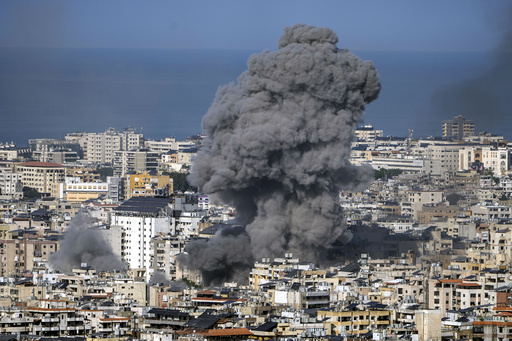
Israeli ground forces advanced further into Lebanon, reaching their most significant position since launching their incursion six weeks ago, only to retreat early Saturday following intense clashes with Hezbollah militants, as reported by Lebanese state media.
According to the National News Agency, Israeli soldiers took control of a crucial hill in the southern Lebanese village of Chamaa, located about 5 kilometers (3 miles) from the Israeli border, early in the day but were subsequently pushed back.
The report indicated that Israeli troops destroyed the Shrine of Shimon the Prophet in Chamaa, along with several residences, before their withdrawal; however, this claim has not been independently verified.
In a statement, the Israeli military confirmed that its forces “continue their limited, localized, and targeted operational activity in southern Lebanon.” There was no immediate response to the media reports from Israeli military officials.
The ground operation was complemented by Israeli airstrikes that targeted areas in the southern suburbs of Beirut, including the port city of Tyre. An attack in the Dahiyeh area of Beirut, identified as a Hezbollah stronghold, was said to have hit various sites associated with the militant group. Residents were given prior notice of the strikes, and it remains unclear if any casualties occurred.
The recent surge in violence coincides with ongoing discussions between Lebanese and Hezbollah officials regarding a cease-fire proposal put forth by the U.S. earlier this week, aiming to end the conflict.
Since late September, Israel has significantly intensified its aerial campaign against Lebanon, pledging to weaken Hezbollah and cease its rocket attacks targeting Israel. Reports from Lebanon’s Health Ministry indicate that more than 3,400 people have died due to Israeli airstrikes, with 80% of these fatalities occurring within the past eight weeks.
On Friday, Lebanon’s caretaker prime minister reportedly called on Iran to use its influence over Hezbollah to facilitate an agreement for a cease-fire with Israel, which would entail the group’s withdrawal from the Israel-Lebanon border region. This proposal is grounded in U.N. Security Council resolution 1701, which concluded the previous Israel-Hezbollah conflict in the summer of 2006.
The U.S. ambassador to Lebanon delivered a copy of the draft proposal to Parliament Speaker Nabih Berri earlier this week. Berri has been acting as a negotiator on behalf of Hezbollah, according to a Lebanese official who spoke anonymously due to the confidential nature of the discussions. Berri is expected to relay Lebanon’s response by Monday.
Another Lebanese political figure mentioned that Hezbollah officials had received and were evaluating the draft, with intentions to communicate their views to Berri. This politician also chose to remain unnamed, citing an absence of authorization to discuss the sensitive dialogues publicly.
Berri stated to the pan-Arab Asharq Al-Awsat newspaper that the draft does not include any provisions permitting Israeli operations in Lebanon if the agreement is violated. “We will not accept any infringement of our sovereignty,” he was quoted as saying.
Additionally, Berri pointed out that Lebanon does not accept the proposal for the establishment of a supervising committee for the agreement, which would include representatives from Western nations. Ongoing discussions regarding this and other aspects of the draft are taking place, with Berri adding that “the atmosphere is positive but all relies on how things will end.”
Efforts to bring an end to the conflict between Israel and Hamas, which erupted after Palestinian militants entered Israel on October 7, 2023, have also gained momentum. This attack resulted in the deaths of approximately 1,200 individuals, primarily civilians, and the abduction of 250 others.
On Thursday, the 10 elected members of the U.N. Security Council circulated a draft resolution calling for “an immediate, unconditional and permanent cease-fire” in Gaza. The likelihood of this resolution passing hinges on the actions of the U.S., Israel’s closest ally, while the other permanent members—Russia, China, Britain, and France—are anticipated to support or abstain from the vote.
In Gaza, Israeli bombings and ground assaults following the initial Hamas attack have reportedly resulted in over 43,000 fatalities, according to Palestinian health officials. While these figures do not differentiate between combatants and civilians, it is reported that more than half of the deceased are women and children.
